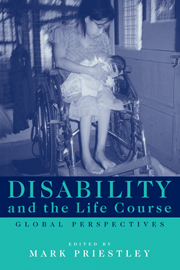Book contents
- Frontmatter
- Contents
- List of figures
- List of tables
- Notes on contributors
- Preface
- Acknowledgements
- A brief note on terminology
- I Concepts
- II Methods and stories
- 6 Life event histories and the US independent living movement
- 7 A journey of discovery
- 8 Using life story narratives to understand disability and identity in South Africa
- 9 Social change and self-empowerment: stories of disabled people in Russia
- 10 Lifting the Iron Curtain
- 11 Revisiting deaf transitions
- 12 The hidden injuries of ‘a slight limp’
- III The politics of transition
- Index
11 - Revisiting deaf transitions
Published online by Cambridge University Press: 30 September 2009
- Frontmatter
- Contents
- List of figures
- List of tables
- Notes on contributors
- Preface
- Acknowledgements
- A brief note on terminology
- I Concepts
- II Methods and stories
- 6 Life event histories and the US independent living movement
- 7 A journey of discovery
- 8 Using life story narratives to understand disability and identity in South Africa
- 9 Social change and self-empowerment: stories of disabled people in Russia
- 10 Lifting the Iron Curtain
- 11 Revisiting deaf transitions
- 12 The hidden injuries of ‘a slight limp’
- III The politics of transition
- Index
Summary
Now if you'll only attend, Kitty, and not talk so much, I'll tell you all my ideas about Looking Glass House. First, there's the room you can see through the glass – that's just the same as our drawing-room, only the things go the other way. I can see all of it when I get upon a chair – all but the bit just behind the fireplace. Oh! I do so wish I could see that bit!
(Lewis Carroll 1871, Through the Looking Glass and What Alice Found There)All researchers, including those who research the life course, work in theoretical practices whose concerns are different from the practical concerns of people as participants in the research. The social relations of research production bring researchers' theoretical preoccupations – and categories – to bear on the process and outcome of the research, sometimes to the point of producing or re-producing particular subjectivities (Corker 1999a, b). For example, Mike Oliver suggests that in his research with Jane Campbell on the ‘disability movement’ (Campbell and Oliver 1996) ‘we were producing ourselves collectively as a coherent, strong and articulate political movement, and individually as proud and committed political actors’ (Oliver 1999: 188). By extension, the researcher is increasingly acknowledged as an active participant in rather than as an objective observer of the research process.
- Type
- Chapter
- Information
- Disability and the Life CourseGlobal Perspectives, pp. 123 - 135Publisher: Cambridge University PressPrint publication year: 2001

